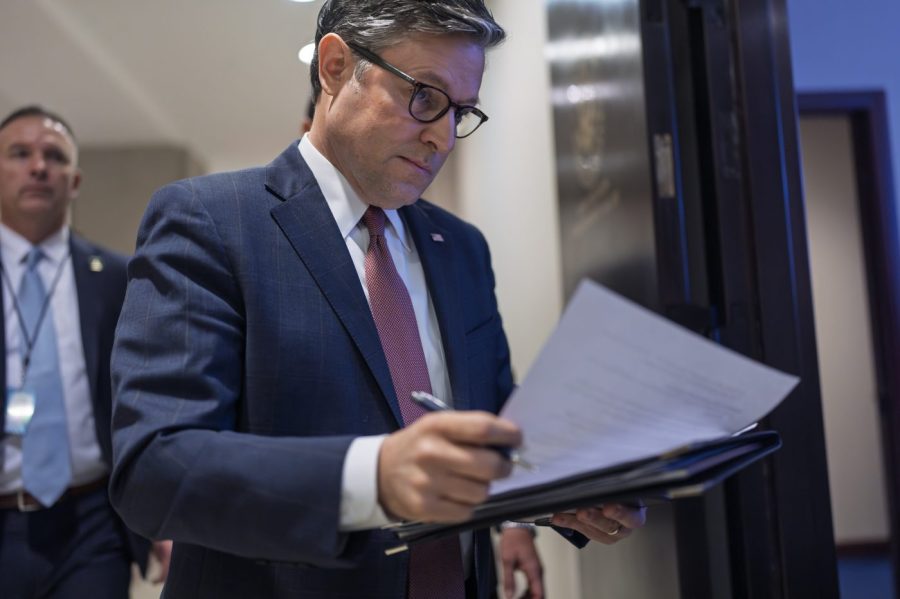
The House Rules Committee voted Monday to advance the GOP conference’s plan to pass President Trump’s legislative agenda, sending the budget resolution to the full chamber even as its fate on the floor remains uncertain.
The panel voted 9-4 along party lines to adopt the rule, which governs debate on the legislation. The successful vote allows the measure to advance to the floor for debate and a final vote.
It remains unclear, however, when the full chamber will weigh in on the legislation, with a number of Republicans across the political spectrum — including moderates and deficit hawks — withholding their support from the measure. Asked on Monday night if the chamber would vote on the legislation Tuesday, which some had anticipated, Speaker Mike Johnson (R-La.) responded, “We’ll see.”
“We got a lot of meetings tonight, and we’ll see about the timing, but it’ll happen this week,” he added.
House Majority Whip Tom Emmer (R-Minn.), meanwhile, was more firm, telling The Hill later Monday evening the vote is “supposed to be after 6” on Tuesday. Asked if that was still the plan, he responded, “Yeah.”
As of Monday night, however, Johnson did not have the votes to adopt the measure, raising the possibility of a delayed — or unsuccessful — vote. Republicans can only afford to lose one vote and still adopt the measure when it hits the floor, assuming full attendance and complete Democratic opposition.
The budget resolution — which the House Budget Committee advanced earlier this month — lays out a $1.5 trillion floor for spending cuts across committees with a target of $2 trillion, puts a $4.5 trillion ceiling on the deficit impact of any GOP plan to extend Trump’s 2017 tax cuts and includes $300 billion in additional spending for the border and defense and a $4 trillion debt limit increase.
Republicans are hoping to adopt the budget resolution to unlock the budget reconciliation process, which they are looking to use to pass one sprawling bill full of Trump’s domestic policy priorities — including border funding, energy policy and extending tax cuts. If successful, the budgetary process allows Republicans to circumvent Democratic opposition in the Senate.
In one corner, deficit hawks are frustrated with the level of spending cuts in the measure. Rep. Victoria Spartz (R-Ind.) said she is “a NO on the current version” of the resolution, and Rep. Tim Burchett (R-Tenn.) told reporters he felt the same way, though Burchett said he could flip his stance if he receives assurances that the committee will slash federal funding in the future.
Rep. Thomas Massie (R-Ky.), meanwhile, wrote on X on Monday “If the Republican budget passes, the deficit gets worse, not better,” signaling that he was opposed to the legislation. And Rep. Chip Roy (R-Texas), who voted to advance the resolution out of the Budget Committee earlier this month, wrote on X on Sunday that he was “open to supporting [the budget resolution] going forward” but signaled that he may have some qualms.
“I supported it in committee – and am open to supporting it going forward – as a framework to see how much Republicans are willing to finally deliver. But statements by some of my colleagues (House & Senate) leave that in doubt,” Roy wrote.
Meanwhile, on the other end of the political spectrum are a growing number of moderate Republicans — including some swing-district lawmakers — concerned about potential cuts to Medicaid. The package directs the Energy and Commerce Committee, which has jurisdiction over Medicaid, to find at least $880 billion in cuts, a figure that many lawmakers believe is only feasible with significant slashes made to the social safety net program.
That notion, however, is prompting worries among moderates.
“I wanna make sure we get to a point where we protect the most vulnerable covered, right now specifically in Medicaid, and there are other issues in there that we need to address as well,” Rep. Juan Ciscomani (R-Calif.), who represents a purple district, told reporters.
“We’re having more meetings, so this is helping, and that’s what I told the Speaker right now,” he added. “All these conversations are helping us get to a place where we want to be obviously supportive of what the president wants and what we as a conference ran on and we won, and we want to make sure that we’re fiscally responsible, we do the appropriate things, root out the waste, the abuse and the fraud in many cases, while protecting the most vulnerable.”












